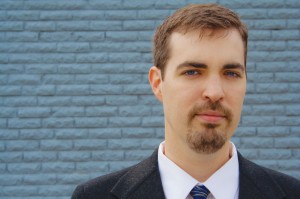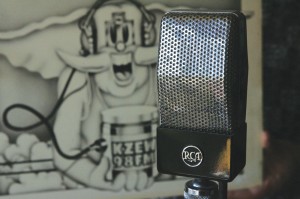A few years ago, John and Sallie had plans to move to New York City to open a free advice booth in Washington Square Park. Well, it was either that or a snow cone stand.
A heart attack forced Rody into retirement, but he’s not the kind of guy who can keep still for too long. After a series of odd jobs, including hosting a webcam talk show at Mambo’s Cantina downtown and driving a cab that was wired with video cameras and microphones in Dallas, he created The Pirate.
Rody said he wanted a station to cast a spotlight on the Fort Worth music scene. The channel only plays music that appears in the “booty box,” a box in Avoca Coffee where local musicians can drop off their albums. (The first iteration of the box, at The Boiled Owl Tavern, was stolen.) Leon Bridges, Siberian Traps, Kevin Aldridge, Jacob Furr, and Sally Majestic are just some of the artists whose music has been aired on The Pirate.
“You can rarely go into Central Market without running into two bass players and a drummer,” he said. “This could be another Nashville –– it’s supported by a major metropolitan area, you’ve got a music culture here, and it’s the Wild West.”
The couple seized the opportunity when congress passed the Local Community Radio Act in 2010. The Federal Communications Commission opened up more space on the FM dial and cleared the way for a number of low-powered stations.
The Rodys applied for an FM channel and in a 2015 Fort Worth Star-Telegram article they encouraged others to own their very own FM channel. But, to their chagrin, only two other stations from Fort Worth applied.
Fort Worth, he said, “had the least amount of applicants of any city this size in America. We went in the Star-Telegram before the applications were accepted, and we told everybody, ‘You can have a radio station.’ It yielded us three: two religious stations and The Pirate.”
Originally, the couple’s brainchild was going to be a more traditional pirate station.
“It was going to be a pirate station [based] in food trucks, so no one could find us,” he said. “That’s when I was rebellious. I’ve really grown up a lot since then.”
The couple raised more than $3,000 for the antenna, transmitter, and tower with an Indiegogo campaign. Their goal was close to $10,000.
Funding the station has been a scrape-knuckle ordeal for the Rodys.
“We’re raising money $5 at a time,” Sallie said.
Rody called the pace at which the station has come together “glacial,” because finding cash has been so difficult.
“I remember a time when if I needed a piece of equipment, I would get someone downstairs to get me a purchase order,” John said. “Now we have to go find the money to build this station.”
When it goes to the FM channel on Saturday, The Pirate will reach an audience of around 1 million people, making it one of the largest public radio stations in America.
*******
There aren’t many rock venues that sell fresh-baked chocolate chip cookies. But the Westside Unitarian Universalist Church in the Near Southside’s Berkeley Place neighborhood is hardly a typical club.
The church hosts the family-friendly Evenings at Westside concert series, designed to bring rock ’n’ roll club-caliber bands to people who are either weary of the club scene or not old enough for it. The place’s concert hall looks like a hotel conference room, with gray carpet and matching banquet chairs lined up facing the stage. But it’s a cozy, welcoming space.

During soundcheck on a recent weekend evening, Matthew Broyles stood onstage hurriedly adjusting knobs while staring intensely at the flickering lights on his eight-track digital recorder. The performance by Ray Reed and Gator, a three-piece (normally six) consisting of two guitarists and a harmonica player, was being recorded for broadcast on The Pirate.
Broyles attended one of the Rodys’ workshops on how to bring ideas to life on the radio. He now hosts The Barbershop, a weekly talk show about the local music scene, and records the church concert series for the station.
The Pirate is distinctly a DIY operation. Rody accesses the station from a portal powered by an antenna on his house. Broyles said the fact that The Pirate doesn’t have a studio –– at least until the basement on South Calhoun Street comes online –– threw off a lot of potential DJs.
“Any show you make, you have to do the whole thing,” he said. “You have to have the gear and edit it. These days it’s easier and cheaper than it ever has been.”
Broyles estimated that the equipment necessary for a barebones home broadcasting starter kit would cost less than $500.
“One of the things The Pirate is doing is giving people access to the tower,” he said.
Once you’ve earned the Rodys’ trust, Broyles continued, “you can request two hours on Saturday night, and they will block off that amount of time. You own that tower for that amount of time. I think that’s pretty cool.”
At the moment, The Pirate’s programming consists mostly of a rotating selection of songs from about 1,000 albums from bands and solo performers.
P.J. Fry, bass player and co-frontman of Sally Mejestic, the funk-rock Fort Worth band that will headline Saturday’s Live Oak fundraiser, said he hopes the station will introduce a new audience to his band.
“That would be my hope,” he said. “As far as promotion goes, it’s really hard for a band that plays originals. There are only a handful of original bands that really have a great draw. For the rest of us, we’re hoping 50, 60 people show up.”
Fry, like some other observers, wasn’t sure if there is enough music coming out of the scene to carry an entire radio station.
“I definitely think that it’s great as far as supporting the bands that this town has,” he said. “I wonder if there’s enough material to keep that thing rolling awhile.”
In the true public radio spirit, The Pirate will broadcast plenty of non-music programming. There are already a handful of original shows like The Barbershop and a couple of podcasts that simulcast on the station. The Wildcatter Exchange community arts organization recently performed radio theater on the channel and plans to do so again soon. James Hinkle narrates the “Texas Music Minute,” about important figures in the state’s music history.
“My suspicion is that once they go terrestrial, there will be more people clamoring to do it,” Broyles said. “That was one of the reasons I wanted to get in early, so I could be assured of a spot.”
All of the DJs are hosting their shows for free, but Rody said there could be some money for them downstream. For example, if an attorney hosts a talk show giving law advice, then that might lead more clients. Most of the people involved, he said, are doing it for fun or to “lash out at the status quo.”
The station’s programming is full of other little quirks. It has a phone line, The Pirate Line, that allows people to call in and rant to voicemail. As long as there is no cursing, “it’ll likely end up on the radio,” Rody said.
The Pirate will also replay blocks of programming from the Zoo every Saturday night and entire albums from the mid 1970s and ’80s.

“Don’t touch your radio. Tonight, we’re going back to 1974!” Rody said in a cartoonishly FM radio voice. “There are very few legacy rock stations that have been off the air for more than 15 years that people still care about. But people still got the stickers and the crap.”
Rody hopes to attract dozens of new on-air talents, although he will not be one of them. Just being the pied piper of the Pirate’s madness is enough for him.
“We didn’t do this so John could be on the radio,” Sallie said. “So many people think that’s why we started a radio station, and it’s not.”
Rhyner said Rody seems like he’s more infatuated with the other facets of the business, and that once he focuses his mind on something, there’s no changing its course.
“He is extremely OC,” he said. “He will get into something, and that is absolutely all he will think about. Right now, these other facets of radio, he’s probably pretty OC about them. Doing an on-air shift doesn’t appeal to him right now.
“Another shiny object has passed his way, and he’s distracted by it,” he joked.
Rody has far simpler explanation for not wanting to be on-air.
“I want the next over-confident asshole to step forward,” he said.
*******












Great story, Eric!
See everyone Saturday 7pm at The Live Oak
Long Live The Pirate!
Rody also had a show on KZPS in Dallas and he had a talk show on KLIF. Both were well done in my opinion. At KZPS he had an occasional mailer that he sent out called Good Mail because everybody likes good mail.
If I had to choose an all time favorite DFW radio personality it would likely be him. And Rhyner was better known as the sports guy at KZEW than LaBella & Rody’s producer.
Yes, Great Story Eric , Going back 3 Decades of Listening to Labella & Rody , Rody was , The Guy ,, We missed Getting to meet him few years back when he was doing local band interviews at The Then Mambos. Now *currently closed venue* ) ..Looking Forward to Meeting One of The Main Reason Why Fort Worth will Back Live on the Air , Hopefully for Decades to Come,,, Looking Forward to it , Love it . South side Pirate .. Rody will be The Man of the Hour.
So Come on Out Fort Worth and Help Power the Tower .. Rock on .Chiquita & Randy Tanner, Fort Worth Tx Since 1954 …
Hey John I’m interested in being a broadcaster for “The pirate” I had a small stint in Radio when I was part of a classic rock show for 88.7 the choice. Give me a call. 9727484577 Ricky Parker 😎😎😎😎😎😎😎😎😎
Hey John I heard that Pamela Steele divorced you because you had a heart attack, I met Pamela in person and when I heard on what she did, sounds she is still a backstabbing cold hearted witch! Take it easy and rock on!